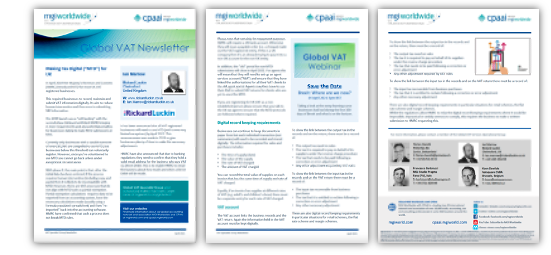Latest Global VAT Specialist Group Newsletter examines Making Tax Digital (MTD) for the UK
In the latest newsletter from the Global VAT Specialist Group, Rickard Luckin's Ian Marrow considers the repercussions of HMRC's introduction of 'MTD' for the majority of UK VAT registered businesses.
In April 2019 Her Majesty’s Revenue and Customs (HMRC) introduced MTD for most UK VAT registered businesses. This required businesses to record, maintain and submit VAT information digitally. Its aim to reduce human intervention and thus error in submitting VAT information.
The 2019 launch was a “soft landing” with the second phase (delayed until April 2021) bringing in more requirements and also potential penalties for businesses failing to make MTD submissions in time.
Currently only businesses with a taxable turnover of over £85,000 are compelled to use MTD, but businesses below this threshold can voluntarily register. However, once you’ve volunteered to use MTD you cannot go back unless under exceptional circumstances.
With phase 2, the main point is that, after the initial data has been entered, if the process requires human intervention (including copy and paste) then it is likely to be incompatible with MTD. However, there are VAT processes that do not align with MTD such as partial exemption. Partial exemption calculations requires data to be exported from an accounting system, have the necessary calculations made (usually using a formula populated spreadsheet) and then “re-imported” back into the accounting software. HMRC have confirmed that such a process does not break MTD rules.
 It has been announced that all VAT registered businesses will need to use MTD (with some very limited exceptions) by April 2022. This announcement was made in 2019 to give businesses plenty of time to make the necessary adjustments.
It has been announced that all VAT registered businesses will need to use MTD (with some very limited exceptions) by April 2022. This announcement was made in 2019 to give businesses plenty of time to make the necessary adjustments.
HMRC have also announced that due to banking regulations they need to confirm that they hold a valid email address for the business who pay VAT via Direct Debit. This is to enable HMRC to email the business about how much and when a Direct Debit will be made.
Please note that certainly for repayment purposes HMRC will require a UK bank account. Otherwise they will issue a payable order (i.e. a cheque) made out the VAT registered entity. If this is a UK company then it‘s an obstacle trying to pay it into a non-UK account for the non-UK entity.
In addition, the “old” portal for non-MTD submissions will close in April 2021. For agents this will mean that they will need to set up an agent services account (“ASA”) and ensure that they have linked the authorisations for all their VAT clients to the old agent portal. Agents may then have to use their ASA to submit VAT returns for clients who are yet to enrol for MTD.
If you are registering for UK VAT as a non-established person please ensure that you talk to the UK tax agent to ensure that the MTD protocols are followed where required.
Read the full newsletter article HERE
If you would like to know more about MTD, please contact Ian Marrow at Rickard Luckin - [email protected].
Our Global VAT Specialists
Our experienced VAT specialists provide a centre of excellence in the field of VAT & Customs across the world. Besides compliance questions, these experts can answer any day-to-day questions as well as assist you, among others, with the correct qualification of transactions, evaluations of contracts, VAT audits and setting up processes together with creating manuals and guidelines. Visit the microsite to meet the Global team.
To learn more about the activities of the Global VAT Specialist Group, or any of the other Groups, please contact International Business Development Manager, Nicki Lynn [email protected].
MGI Worldwide with CPAAI is a top 20 ranked global accounting network and association with over 10,000 independent auditors, accountants and tax experts in some 460 locations in almost 100 countries around the world.


